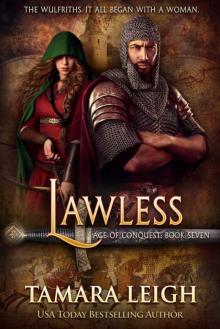- Home
- Tamara Leigh
LADY EVER AFTER: A Medieval Time Travel Romance (Beyond Time Book 2) Page 4
LADY EVER AFTER: A Medieval Time Travel Romance (Beyond Time Book 2) Read online
Page 4
As he was dragged upright, the injuries done him in this dream state made him long to shout, but he closed his mouth against phantom pain.
“He will talk this night,” Severn said.
“Nay.” Aryn in the guise of Catherine Algernon shook her head. “Morn comes soon enough.”
“But my lady—”
“I said nay. These few hours ere dawn, let him reflect on his injuries—and those to come.”
Face tight, Severn gestured to the soldiers. “Bring him.”
As Collier was forced past Aryn, he captured her gaze. Her eyes were the same as those which had gazed out from Catherine Algernon’s portrait all these years—not blue, but violet. Aryn. And yet not.
But such was the game his mind played.
“Move!”
Collier was thrust out of the room into the corridor, then down spiraling stairs that opened onto a great hall. Though the layout was roughly the same as Strivling’s twentieth-century counterpart, five hundred years and a siege stood between the two versions.
Here a confusion of bodies vied for sleeping space, filth abounded on the rare inches of floor, and the cloying stench likely meant the castle folk’s retreat to the keep in the inner bailey was due to Montagu’s forces breaking into the outer bailey. Which also meant it was past the middle of May. Thus, if what his mind had conjured followed history, Strivling had only one or two days before it fell.
Outside, Collier was struck by cold, sea-scented air. It chilled—as if this truly was northern coastal England.
As he was hastened down stone steps, he searched the bailey. Though the stronghold’s inner walls kept out Montagu’s forces, evidence of the siege was everywhere. Many of the inner buildings were only blackened remains, and most of those standing were damaged. Rubbish littered the ground, and soldiers curled up amongst it to catch a few hours of sleep.
Surprised his imagination had formed all this from what he knew of Catherine Algernon’s resistance, Collier looked to the wall-walk where soldiers moved cautiously between the battlements, then to the gatehouse to which he was being led. He knew it, having once toured that place which accessed the dungeons where Montagu’s men had been imprisoned.
“Guard!” Severn called as he entered ahead of Collier.
An armored man appeared. “Escaped capture this morn like the other one, eh?”
Other one? Collier wondered.
“Aye, caught him in Lady Catherine’s chamber trying to violate her.”
The guard’s face darkened. “Ye probably cannot wait to question him.”
“Unfortunately, it must needs wait ’til morn.”
“Best done now, Sir Severn.”
The big man’s knuckles cracked as they closed into fists. “Lady Catherine commands otherwise.”
The guard shrugged. “I should put him with the others?”
Severn inclined his head, turned to Collier. “First light,” he said and strode from the gatehouse.
“Remove his hauberk and boots,” the guard ordered.
Reminding himself soon he would awaken with only a vague memory of this dream, Collier stood unmoving while the soldiers dragged off his chain mail and boots.
Wearing only a tunic and hose of the middle ages, he was ushered into the stinking bowels of the dungeon, past cells from which no sound issued, and into a large room with a metal door set in the floor.
Though during Collier’s visit to Strivling Castle he had not explored the pit where Montagu’s men had been held, he had shined a flashlight into it and seen the crude stone walls and earthen floor fifteen feet below.
The guard heaved back the door.
Collier knew he should resign himself to the remainder of this dream, but as he was dragged forward, he wrenched an arm free and slammed an elbow into the gut of the man on his left. The soldier yelped, but before Collier could turn on the other one, a fist struck his jaw and he was thrust back into darkness.
Unfortunately, his mind did nothing to protect him from the imagined pain of hitting the earthen floor. Though it was far distant from all he had suffered during and after his climbing accident, he groaned as the trapdoor slammed overhead.
Doused in darkness, he lay there some moments before sitting up.
“Are there any others left?” a voice came from the right.
“Others?”
“Those not captured this morn with the rest of us.”
“I didn’t see anyone else.”
The man muttered something, then asked, “What is your name?”
“Collier.”
“I am Morrow. Sir Edmund Morrow.”
Collier stared into the darkness. It followed he would meet his ancestor in this dream, but Edmund’s presence also meant that, come dawn, he would lead the others in an escape that would see bloody history made in the winch room. There, Catherine Algernon would give her life in defense of a fallen castle.
As it also meant her murderer, Rudd Walther, was among those in the pit, Collier wondered when his imagination would reveal that one to him.
“Come nearer,” Edmund said.
Though Collier wanted to throw off this dream and its accompanying pain, he moved toward Edmund’s voice. “Morrow?” he said when his foot bumped another’s.
“Sit beside me.”
Easing himself back against the wall, Collier grimaced as the moisture seeping through the stones wet him through his tunic. Still, the wall’s support was a comfort to his battered body.
“What did you learn?” Edmund asked.
What had he learned? Only that this dream borne of grief and a fertile imagination had made Catherine Algernon into the image of the woman he had loved. But since there was nothing to do but play the dream out to its blessed end, he drew on his knowledge of history. “The defenders are nearing starvation, the well is almost dry, and there is talk of surrender.”
Edmund seemed to consider this, then said, “You speak strange, my friend.”
Though Collier’s dream had provided him with medieval garb, his English remained modern. But as Edmund was from these Northumbrian lands which, to venture farther north would see one in Scotland, Collier decided it was easiest to explain his speech as being a different dialect.
“I come from Wessex,” he named an area of southern England.
“Cannot say I ever heard one from Wessex talk as you do,” said someone farther along the wall.
“Aye,” piped another, “mayhap you but seek to ferret out Montagu’s plans.”
“Or you do,” Edmund countered.
The man grumbled but spoke no more.
“The same is said of each man thrown down after the others,” Edmund explained. “Before you it was Walther who escaped early capture. He made it to the winch room ere being apprehended.”
So Rudd Walther was the other one the guard had spoken of.
“I would have had the drawbridge down had that oaf not come when he did,” Walther said.
“You speak of Severn?” Collier asked.
“Aye, Catherine’s dog. He and his men beat me when I would not tell him what I knew. Upon my life, he is the first I shall kill when I escape.”
“’Twill happen soon enough,” Edmund said.
Then his ancestor had already laid his plans, Collier mused.
“You were questioned, Collier?” Edmund asked.
“I was not.” Though he might as well have been for the beating he had taken. Collier felt his nose. It wasn’t broken as feared. “Ar—” He caught back her name. “Lady Catherine ordered the questioning done in the morning.”
“Then it is night. Where were you captured?”
“In her room.”
“The lady’s bedchamber?” Edmund exclaimed.
“Yes.”
“Ah, you planned to use her to gain Montagu entrance.”
That explanation more believable than the truth, Collier said, “I did, but Severn and his men appeared.”
“How is it you made it into the keep unopposed?�
�
How would his ancestor react if told Collier had simply dropped in, exchanging jeans and collared shirt for hose, tunic, and chain mail?
“Though the passages are guarded,” Collier said, “the soldiers are too weary to keep watch.” From what he had seen, it was likely the truth. “I had little difficulty getting past them.”
Silence, then Edmund said, “We must escape soon.”
“How?”
“That I keep to myself, friend. You understand. Now let us sleep. Morning comes soon.”
His beaten body exhausted, Collier closed his eyes, certain that when next he opened them he would find himself returned to his own world.
CHAPTER FIVE
The dream again. Just as menacing and frightening, though this time when she swung her sword toward the leering one, another appeared. A large man, taller and broader of shoulder than any she had seen. It was into his flesh she sank her blade, his face she saw clearly—the Yorkist who had tried to violate her. And called her Aryn.
As she stumbled back against the winch, he lunged and wrested the sword from her, then moisture seeped through her gown. Though she knew what he had done, she lowered her chin to watch the crimson spread across her bodice. As ever, she felt no pain. But unlike those other times, it did not then rush in to assure her it had not abandoned her.
“My lady?” a voice swept away the dream.
Opening her eyes, Catherine stared at the rumpled sheet she lay upon. She yet breathed. But though the dream was gone the same as the others, what remained was remembrance of the one who had slain her—he who called himself Collier.
Why had the dream changed? Why was it not the one with leering eyes who put her through?
“My lady?” her maid said again and gently shook her shoulder.
Catherine lifted her head and looked up at Tilly whose kindly face was revealed in the bare light of a dawn come too quickly. “I am awake. Is it time?”
“Aye, Sir Severn says to make haste.”
Catherine released the dagger she gripped beneath her pillow, leaving it there so she would not alarm Tilly. “Tell him I shall join him shortly but to proceed.”
“You would not have me assist with your ablutions?”
“’Tis unnecessary.” Of what use a lady’s maid when there was not much of the lady left about Catherine Algernon? She would wash her face and hands, dress, and make her way to the dungeon. “Go now.”
At the door, Tilly peered over her shoulder. “How are your dreams, my lady?”
It was the same question the older woman was wont to ask, as if she knew they were more than the dreams others dreamed. But she could not know, Catherine having never shared them with anyone but her father.
Shortly before being sent to live at Strivling, she had gone to Lewis Algernon following long nights of little sleep and told him of a dream in which she had seen a great army come against the king’s. Her father had grown still, and afterward he had made her promise to never again speak of her dreams, warning that others might think her a witch. Thus, she had held them close—even years later when her betrothed’s mother, Hildegard, had mentioned the Duke of York’s first attempt in 1452 to steal the throne from King Henry. That event had coincided with the dream Catherine had revealed to her father.
Holding Tilly’s gaze, she said, “As ever, I can hardly remember my dreams upon awakening.”
The maid inclined her head, then stepped into the corridor and closed the door.
From beneath the pillow, Catherine withdrew the dagger, the blade of which had tasted the man who had invaded her chamber yestereve—the same traitor who had slain her in the dream from which Tilly had awakened her. Recalling the blood on her bodice, she shuddered.
Her dreams were a curse. Unbidden, she relived the one that had visited her two years past during the first of Edward’s sieges upon Strivling. She had foreseen the death of the woman who was to be her mother-in-law, and the next day Hildegard’s heart had released her from life.
Remembering the Lady of Strivling gripping her chest and her headlong flight down the stairs, she swallowed hard and wished Hildegard were here.
Catherine had been seven when she arrived at Strivling to be raised by her betrothed’s mother. At first, she had feared the domineering woman, but Hildegard had not been cruel. She had only been determined that the one who wed her guileless son become as strong as she, herself, was for her husband. Thus, Catherine’s fear had eventually turned to respect and a strong desire to please. And unapproachable Hildegard had come to care for the daughter who was not of her womb. But all for naught.
Eyes moistening, Catherine bowed her head.
You must be strong, Hildegard spoke to her as if from the grave. There is none other able to turn the usurper from these walls.
She drew a deep breath. She would be strong, unlike her betrothed, Lambert, who had been as weak as his father—both killed during the first days of this siege, one by a ball of burning pitch, the other by an arrow.
“I shall not fail you, Hildegard,” she whispered. Though Strivling’s food and water supplies would soon be depleted, more and more talk of surrender was heard from the castle folk, and the barony’s lesser castles had yielded to King Edward—including Irondale, held by her father—she would not allow the usurpers to take Strivling. With her last breath, she would defend it. Just as Hildegard had done. Just as she, herself, did in her dreams.
Another chance. One more.
The words sounded through Collier as he saw himself sitting on his bed with his head back. Then the paint began to flutter down around him. And as he looked toward the portrait, he awoke to darkness.
The pit continued to hold him, the stench to assail him, and the cold to clothe him—as if the dream thought to do him a kindness in denying him reality. Or was it a dream? Did one dream within a dream?
He shoved fingers through his hair and gripped the back of his head. Were he still on painkillers, he could blame them for whatever this was, but it was over six weeks since he had found relief in them. And even during the worst of the withdrawal, nothing like this had happened. Pain and intense yearning had tormented him, not hallucinations and dreams so real they soaked his senses.
Still, it would be madness to accept as reality what was nothing more than a fascination with Catherine Algernon, coupled with the longing for another chance with Aryn.
He grimaced when the door overhead whined open, admitting just enough light to give shape to those in the pit—a dozen men.
“Collier!” A rope ladder dropped into the pit. “Climb up!”
He pushed off the wall, but as he started to rise, a hand gripped his arm.
“If you live, friend,” Edmund said low, “I will take you with me when I go.”
Collier picked out the sparkle of his ancestor’s eyes. “I will live.” The aches of his beating protesting movement, he rose and crossed to the ladder. Rung after rung he climbed, and as he neared the top, a lantern was thrust into the pit. Blinded by it, he turned his head away.
“’Tis him,” growled the one called Severn.
Hands clamped on Collier and dragged him up into the room.
As the trapdoor dropped, its meeting with the metal frame vibrating through the soles of his feet, he squinted at the place to which he was being led. And began to struggle.
Grunting and cursing, his captors forced him back against a wall fit with manacles, and as they wrenched his arms up to the sides, Severn stepped in front of him and pressed a blade to his captive’s abdomen. “We can end this now, traitor.”
As Collier stared at the man, his anger surged, but reason reined it in. He had not journeyed back in time only to die at this man’s hands.
An instant later, he stilled at the realization of where his thoughts had taken him—down a path that did not even aspire to run parallel to reason. This wasn’t real, meaning it didn’t matter what this man did to him. Eventually, Collier would awaken where he belonged, and the worst he would have to show f
or this torture would be swiftly fading images.
The soldiers fastened the manacles around Collier’s wrists, and when they withdrew into the dim corridor, Severn demanded, “Your name?”
“It hasn’t changed—Collier.”
“All of it.”
Since his surname couldn’t be Morrow in this past that belonged to his ancestor, he searched for another. And once again pulled himself up short with the reminder this wasn’t real.
The back of a hand snapped his head to the side. “Speak!”
Though defiance put Morrow on his tongue, it was his middle name that came off it. “Gilchrist. I am Collier Gilchrist.”
Severn’s brow rippled. “Gilchrist?”
Before Collier could fathom his confusion, a woman said, “’Tis not usual for a man to first refer to himself using only his Christian name.”
Shifting his gaze past Severn to the one who stood just inside the room, Collier’s heart ached to look upon Aryn cast in the role of the doomed Catherine Algernon.
She raised her eyebrows. “Especially to those he does not know.”
Though he was aware surnames were more prominently used in these times, one’s first name being reserved for intimates, he had forgotten.
Wearing a gown that hung on a figure he had not realized was so gaunt, she stared at him out of a face that was careworn, albeit less mature than that of Aryn who was—
He swallowed, set his teeth.
—Aryn, who had been twenty-six. But though the woman before him didn’t look more than twenty, her eyes were much older than those of the one lost to him. And as unfeeling today as last night.
She stepped forward. “You are a mercenary.”
Since he had already been named a Yorkist, a mercenary seemed as good a role as any. “I am.”
“But not a knight.”
His poor show of swordsmanship hadn’t escaped her attention. And though he was descended from Edmund Morrow, he remained reluctant to lay claim to that noble blood. “I’m a soldier.”

 FEARLESS: Book Two: Age of Conquest
FEARLESS: Book Two: Age of Conquest BOUNDLESS: A Medieval Romance (AGE OF CONQUEST Book 6)
BOUNDLESS: A Medieval Romance (AGE OF CONQUEST Book 6) Lady Betrayed
Lady Betrayed Merciless
Merciless Nowhere, Carolina
Nowhere, Carolina Virgin Bride
Virgin Bride Blackheart
Blackheart Restless in Carolina
Restless in Carolina THE AWAKENING_A Medieval Romance
THE AWAKENING_A Medieval Romance Baron of Blackwood
Baron of Blackwood Leaving Carolina
Leaving Carolina HEARTLESS: A Medieval Romance (Age of Conquest Book 4)
HEARTLESS: A Medieval Romance (Age of Conquest Book 4) Baron of Godsmere
Baron of Godsmere Lady Of Eve
Lady Of Eve LAWLESS: A Medieval Romance (AGE OF CONQUEST Book 7)
LAWLESS: A Medieval Romance (AGE OF CONQUEST Book 7) Lady Of Fire AKA Pagan Bride
Lady Of Fire AKA Pagan Bride The Yielding (Age of Faith)
The Yielding (Age of Faith) The Redeeming: Book Three (Age of Faith)
The Redeeming: Book Three (Age of Faith) LADY UNDAUNTED: A Medieval Romance
LADY UNDAUNTED: A Medieval Romance THE RAVELING: A Medieval Romance (Age of Faith Book 8)
THE RAVELING: A Medieval Romance (Age of Faith Book 8) LADY EVER AFTER: A Medieval Time Travel Romance (Beyond Time Book 2)
LADY EVER AFTER: A Medieval Time Travel Romance (Beyond Time Book 2) Dreamspell
Dreamspell The Unveiling (Age of Faith)
The Unveiling (Age of Faith) THE RAVELING
THE RAVELING Splitting Harriet
Splitting Harriet Age of Faith 4 - The Kindling
Age of Faith 4 - The Kindling THE RAVELING_A Medieval Romance
THE RAVELING_A Medieval Romance Perfecting Kate
Perfecting Kate Misbegotten
Misbegotten THE VEXING: A Medieval Romance (AGE OF FAITH Book 6)
THE VEXING: A Medieval Romance (AGE OF FAITH Book 6) LadyOfConquest:SaxonBride
LadyOfConquest:SaxonBride